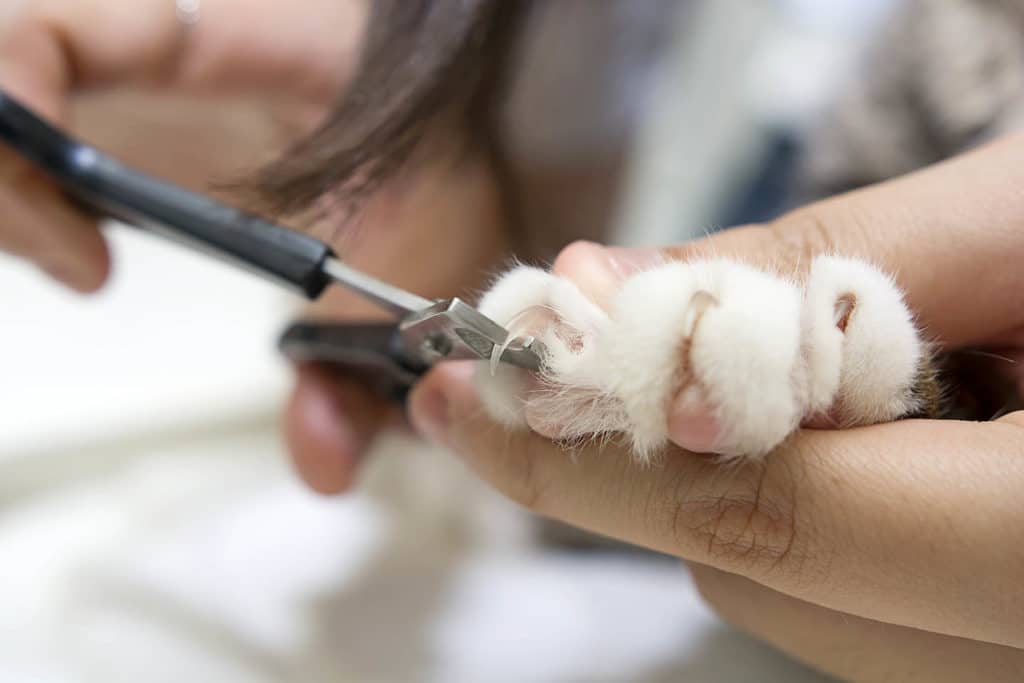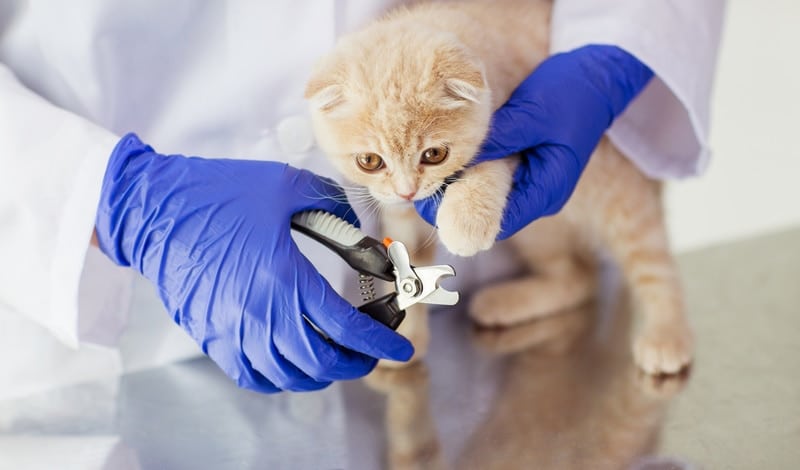As a pet parent, you’ve seen your new kitten sharpening their claws on everything from the carpet to the couch more than once. Not only that, but kitten’s claws are incredibly sharp, and if you don’t do something about them, they can hurt you, your other pets, and your furniture.
If you’re wondering how you’re supposed to trim your kitten’s nails and how often, you’ve come to the right place. In the article below, we’ll answer your questions and give you some tips for clipping your kitten’s claws.
How Often Should You Trim Your Kitten’s Nails?
How often you trim your kitten’s nails will depend on your kitten’s lifestyle. However, a good rule of thumb to follow is trimming the kitten’s nails once or twice a month, as needed. Not only will this prevent their nails from getting too long and sharp, but it’ll also help get the kitten used to having their nails trimmed.
It’s best to start trimming your kitten’s nails between 4 and 8 weeks of age, as this will help the cat get used to the procedure. It’s best to do one paw at a time, however, so as not to traumatize your little furry friend.
Now that you know how often to trim your furry friend’s nails, we’ll give you a few steps for getting the job done in our next section.
 How to Trim Your Kitten’s Nails in 4 Steps
How to Trim Your Kitten’s Nails in 4 Steps
Trimming your kitten’s nails doesn’t have to be hard. However, you do need to be careful when doing so. Following the steps below should help with the task.
1. Gather Your Supplies
The first thing you’ll want to do is gather your supplies. You don’t want to have to leave your kitten in the middle of trimming to get something you forgot. You’ll need a special nail trimmer, as you can’t use a pair of nail clippers for humans on a kitten’s claws. Using the wrong trimmer can lead to your kitten being injured and their nails splintering.
Trimming your cat's nails at home can be hard, but having a professional do it can be expensive. With the help of great tools like Hepper's Cat Nail Clipper Set, you can easily and quickly trim your cat's nails at home. This set includes two pairs of stainless steel clippers with safety guards and locking mechanisms, plus a built-in nail file and a convenient pouch. At Catster, we’ve admired Hepper for many years and decided to take a controlling ownership interest so that we could benefit from the outstanding designs of this cool cat company!
2. Find a Quiet Spot
You’ll want to find a quiet spot away from distractions, noises, or surprises so your kitten isn’t startled during the nail trimming. Remember, this is a new thing that you’re introducing into your kitten’s life, so of course, the kitten will be nervous and skittish.
If you’ve never done this before, you might be nervous as well. It’s best to schedule nail trimming sessions when the cat is sleepy and relaxed after eating.

3. Only Trim the White
You only need to trim the white part of the nail to keep from injuring the kitten. The kitten’s nails are white on the tips and pink closer to the paw. You should only trim the white part of the kitten’s nails, as the pink part is tender and contains blood vessels. The pink section is called the quick, and if it’s cut, it’ll bleed. However, some feline nail clippers are designed to protect the quick by preventing you from cutting more than the white area of the nail.
First, gently press your kitten’s paw to expose the claw. Then, cut the nail at a slight angle just below the quick. If your kitten becomes irritated and tries to run, end the session and try again later. However, if your kitten stays calm, offer a treat and end the session. Next time, you can aim for two claws. After you successfully trim two claws once or twice, you can try doing three, and so on.
4. Use Treats, Praise, and Positive Reinforcement
Treats, praise, and positive reinforcement are essential for trimming your kitten’s nails. Make sure to talk softly to your little friend while trimming its nails, and reward the feline with treats or toys when you’re finished.
Never yell at or scold your kitten, as that will only make the cat more afraid and will even make them struggle to get away.
- Related Read: How to Use Cat Nail Clippers
Final Thoughts
Trimming a kitten’s nails ensures they aren’t too long and sharp. This procedure can protect you and your kitten from injury from their sharp claws. It’s recommended that you trim your kitten’s nails every 2 weeks or once a month, as needed. Begin trimming as early as 4 to 8 weeks of age so that your kitten can get used to the process.
Following the steps above can help you trim your feline’s nails safely and effectively. Don’t forget to pile on the praise and treats once the kitten sits still for you to perform the procedure and once it is done.
Featured Image Credit: Ground Picture, Shutterstock



 How to Trim Your Kitten’s Nails in 4 Steps
How to Trim Your Kitten’s Nails in 4 Steps








